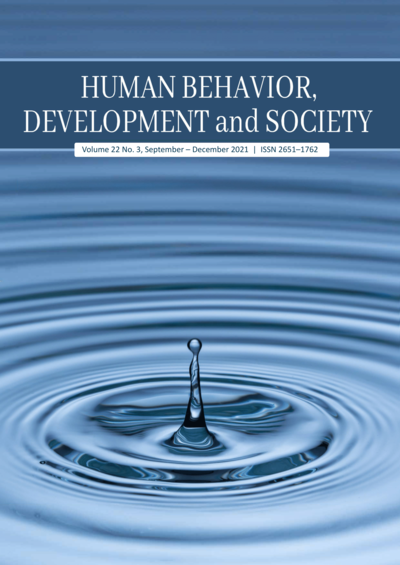Cultivating State-of-the-Art Competencies and 21st Century Skills for Hospitality Management Students: A Learning and Development Model
Main Article Content
Abstract
In this study desired competencies were examined in relation to the 21st century skills of Hospitality Management students. The survey results revealed that students were competent in terms of being cooperative, following instructions, getting along with others, being dependable and productive, taking initiative, and displaying workplace competencies, but less competent in the quality of their work. The students’ 21st century skills were also good or manifested to a great extent in their collaboration skills, personal and workplace skills, self-direction skills, thinking and reasoning skills, and creativity and innovation skills. However, their information and communication skills were not as strong. Correlation existed between desired competencies and students’ 21st century skills, revealing that those with highly-desired competencies also manifested 21st century skills. Students experienced issues regarding management of the company and confusion about their work assignments. It can be concluded that students’ lack of information and communication skills influenced their quality of work, and led to concerns with the company where on-the-job training was conducted. Hence, to cultivate state-of-the art skills, a learning and development model was formulated that focused on improving their quality of work, and strengthening their information and communication skills.
Article Details

This work is licensed under a Creative Commons Attribution-NonCommercial-NoDerivatives 4.0 International License.
Copyright: Asia-Pacific International University reserve exclusive rights to publish, reproduce and distribute the manuscript and all contents therein.
References
Alhelalat, J. A. (2015). Hospitality and non-hospitality graduate skills between education and industry. Journal of Business Studies Quarterly, 6(4), 46–55.
Barrows, C. W., & Johan, N. (2008). Hospitality management education. In B. Brotherton & R. C. Wood (Eds.), The Sage handbook of hospitality management. Sage. http://dx.doi.org/10.4135/ 9781849200417.n7
Benckendorff, P., Moscardo, G., & Pendergast, D. (2010). Tourism and generation Y. Cambridge, Centre for Agriculture and Bioscience International.
Borich, G. D. (1980). A needs assessment model for conducting follow-up studies. Journal of Teacher Education, 31(3), 39–42. https://files.eric.ed.gov/fulltext/ED189079.pdf
Busby, G. D., & Gibson, P. (2010). Tourism and hospitality internship experiences overseas: A British perspective. Journal of Hospitality, Leisure, Sport and Tourism Education, 9(1), 4–12.
Commission on Higher Education. (2017). Memorandum No. 62, Series of 2017. https://ched.gov.ph/cmo-62-s-2017/
Department of Education. (2019, December 4). Statement on the Philippines' ranking in the 2018 PISA results. https://www.deped.gov.ph/2019/12/04/statement-on-the-philippines-ranking- in-the-2018-pisa-results/
EHL Insights. (2020). Hospitality industry: All your questions answered.
https://hospitalityinsights.ehl.edu/hospitality-industry
Harkison, T., Poulston, J., & Kim, J. J. (2011). Hospitality graduates and managers: The big divide. International Journal of Contemporary Hospitality Management, 23(3), 377–392.
Henry, J. S., Rehwaldt, S. S., & Vineyard, G. M. (2001). Congruency between student interns and worksite supervisors regarding critical elements of an internship experience. Information Technology, Learning, and Performance Journal, 19(1), 31–42.
Hodges, D., & Burchell, N. (2003). Business graduate competencies: Employers’ views on importance and performance. Asia-Pacific Journal of Cooperative Education, 4(2), 16–22.
Hora, M., Lee, C., Zi, C., & Hernandez, A. (2021). Exploring online internships amidst the Covid-19 pandemic in 2020: Results from a mixed-methods study. Center for Research on College-Workforce Transitions (CCWT), University of Wisconsin-Madison. https://ccwt.wceruw.org/wp-content/uploads/2021/05/CCWT_report_ Exploring-online-internships-amidst-the-COVID-19-pandemic-in-2020.pdf
Juan, R. S. (2019, December 4). DepEd welcomes PISA results, recognizes 'gaps' in education quality. https://www.philstar.com/headlines/2019/12/04/1974229/deped-welcomes-pisa-results-recognizes-gaps-education-quality
Kaushal, V., & Srivastava, S. (2021). Hospitality and tourism industry amid COVID-19 pandemic: Perspectives on challenges and learnings from India. International Journal of Hospitality Management 92, 102707. https://doi.org/10.1016/j.ijhm.2020.102707
Kim, Z. Y., Kim, S. S., Seo, J., & Hyun, J. (2011). Hotel employees’ competencies and qualifications required according to hotel divisions. Journal of Tourism, Hospitality & Culinary Arts, 3(2), 1–18.
Laguardo, J. M., Deligero, J. C., & Cueto, A. (2015). Students’ evaluation on the teaching performance of tourism and hospitality management faculty members. Asian Journal of Educational Research, 3(3), 28–33.
Lee, S. (2006). A comparison of student perceptions of learning in their co-op and internship experiences and the classroom environment: A study [Doctoral dissertation, University of Central Florida]. https://stars.library.ucf.edu/etd/969
Maher, A., & Neild, K. (2005, January 27–28). Enhancing student employability: Higher education and workforce development [Paper presentation]. 9th Quality in Higher Education International Seminar, Birmingham, AL, United States.
O’Mahony, G., McWilliams, A. M., & Whitelaw, P. A. (2001). Why students choose a hospitality degree program. The Cornell Hotel and Restaurant Administration, 42(1), 92– 96.
Partnership for 21st Century Skills. (2008). 21st century skills, education & competitiveness: A resource and policy guide. https://www.21stcenturyskills.org/documents/21st_century_skills_education_and_ competitiveness _guide.pdf
Rainsbury, E., Hodges, D., Burchell, N., & Lay, M. (2002). Ranking workplace competencies: Student and graduate perceptions. Asia-Pacific Journal of Cooperative Education, 3(2), 8–18.
Ravitz, J. (2014). A survey for measuring 21st century teaching and learning: West Virginia 21st Century teaching and learning survey (WVDE-CIS-28) [Data set]. https://www.researchgate.net/publication/289377968_ _survey_for_measuring_21st_century_teaching_and_learning_West_Virginia_21st_Century_Teaching_and_Learning_Survey_WVDE-CIS-28
Razak, A. R., Zainol, N. A., & Shariff, N. M. (2014, November 5–6). Hospitality management competencies: Identifying graduates’ essential skills [Paper Presentation]. Proceedings of the 2nd Tourism and Hospitality International Conference, Langkawi, Malaysia.
Saad, H. E., & Ali, H. (2016). Students' expectations towards careers in the hospitality industry in Egypt. International Journal of Heritage, Tourism, and Hospitality, 8(1). https://www.semanticscholar.org/paper/Students'-Expectations-towards-Careers-in-the-in-Saad-Ali/2d71c833a1b54bf745d25a28563f1970f2bc576a
Strachan, L. (2016). Teaching employability skills through simulation games. Journal of Pedagogic Development, 6(2), 8–17.
Tesone, D. V., & Ricci, P. (2006). Toward a definition of entry-level job competencies. International Journal of Hospitality & Tourism Administration, 7(4), 65–80.
Umar, R. (2006). Modul pembangunan kemahairan insaniah (Soft Skills) untuk Institusi Pengajian Tinggi Malaysia [Soft Skills development module for Malaysian Institutions of Higher Learning]. Penerbit Universiti Putra Malaysia. https://123dok.com/document/y623964z-modul-pembangunan-kemahiran-insaniah-soft-skills-untuk-malaysia.html
Yorke, M., & Harvey, L. (2005). Graduate attributes and their development. New Directions for Institutional Research, 128, 41–58.


